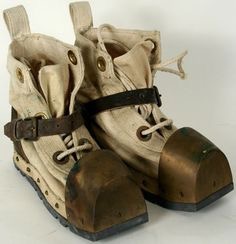Grudges

"I finally decided that maybe I could live with myself again, so I did."
Grudges have become badges of honor, honoring some past insult. We wear them like deep sea diving boots, hardly handy for tap dancing, or even walking around. They seem to ground us but tend to sink us instead. Still, social and political movements feature grudges as a part of members' required uniform. One cannot join without prominently displaying their grudge. Stadiums fill with supporters seemingly present to show off their personal grudge to others, some competing to demonstrate that their grudge is bigger than anyone else's. Just as if they could fix the past by dragging a particularly wounding part of it around with them, they engage in a kind of group primal therapy, howling at their common misbegotten moon. ©2018 by David A. Schmaltz - all rights reserved
It might be that nurturing the memory prolongs the past slight's life. Rather than bury or otherwise dispatch the demeaning experience, the memory sustains its life. Over time, the damage done by dragging around the damned thing might well exceed whatever devastation the original infraction caused. Grudges are the loser's revenge. They are a 'cut off my nose to spite my face' rejoinder. Carefully nurtured, they can justify almost any response. They defend the ego by sequestering their holders securely in the past, seemingly safe from present threats while holding them in sublime isolation within a dark dungeon, creating backwards Diogeneses cynically looking for dishonest men to hold blame for their own excess baggage. It hardly matters where they look. Their quest seeks to find the guilty party for purposes of retribution.
I believe that I hold the ethical responsibility to know enough to fully justify cynicism without embracing it. If I don't know enough to fully support a cynical outlook, I might find myself naive. But if I embrace cynicism, I sink myself. Nobody needs another naif rampaging around. Nobody needs another wounded-optimist cynic rampaging around, either. I try to inhabit a more central space, one which might lend some leverage for coping with my disappointments rather than some bottomless pool within which to sink while wearing them. The grudge seems the most canny adversary. It follows as stealthily as any shadow. I'm unlikely to recognize just how closely it's tied to me. If I turn off the spotlight, the shadow disappears. If I keep my eyes forward, I might never notice its presence. Because it seems to nurture me, I cannot simply let go.
I ask my grudge to follow me along, more fully acknowledging its presence. I find myself pregnant with possibility, eating myself from the inside out, eating for two. The conductor explains that I'll need to buy two train tickets if I'm going to bring my companion along. We have to share a seat and a bathroom. I find it hard to sleep at night with it nudged up altogether too close in bed beside me. I eventually pine after freedom again. I find that I cannot just let go, but the very thought of releasing my dependent's grasp begins to loosen it. I might practice going out without my deep sea diving shoes on and find myself almost tap-dancing down the street. I meet myself heading south and decide that I might prefer to head north for a change. I sneak out in the middle of the night and don't leave a note. I wonder sometimes where my grudge went after we parted ways.
In retrospect I realize just how clueless my grudge had rendered me, how myopic, how glum. My heavy heart hardly pumped blood anymore, favoring icy water instead. We could hardly fit through any doorway and had almost grown accustomed to always going around the long way without ever going inside. I was wronged. I insisted until my very insistence became the greater wrong. I finally decided that maybe I could live with myself again, so I did.


